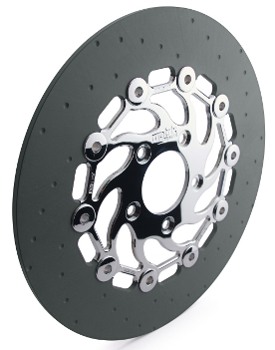 |
| April 24, 2012 | Volume 08 Issue 16 |
Designfax weekly eMagazine
Archives
Partners
Manufacturing Center
Product Spotlight
Modern Applications News
Metalworking Ideas For
Today's Job Shops
Tooling and Production
Strategies for large
metalworking plants
Wheels:
Lightweight, ultra-durable brake rotors coming to mass market

Researchers at NYU-Poly are developing a mass-market, ultra-durable composite brake.
Due to expense, today's composite brakes are usually reserved for motorcycles, race cars, and high-performance sports cars, but a new, fiber-reinforced, metal matrix composite (MMC) brake rotor is being developed for the mass market. It will be easier to manufacture, and the fiber reinforcements will provide a longer life span.
Researchers at the Polytechnic Institute of New York University (NYU-Poly) and Michigan-based REL, Inc., are creating a next-generation aluminum composite brake rotor potentially weighing 60% less than today's cast iron rotors – with triple the life expectancy.
The researchers estimate that their composite rotor will shave approximately 30 lb from a mid-size sedan – a significant advantage in an industry facing a fleet fuel economy requirement of 54.5 mpg by 2025.
REL, Inc., a developer of MMC transportation and aerospace components, received a $150,000 Phase I Small Business Innovation Research Grant from the National Science Foundation to develop the initial product design, material, and manufacturing process. The company tapped the expertise of NYU-Poly Mechanical and Aerospace Engineering Associate Professor Nikhil Gupta and his Composites Materials and Mechanics Lab to develop the technology for automotive application. The collaboration will result in a prototype, first-of-its-kind rotor that aims to revolutionize a market valued at $10 billion annually.
Manufacturers have long sought to improve the durability and performance of automotive brakes, which are subject to tremendous temperature and pressure changes.
Gupta and REL are developing a one-piece brake rotor uniquely tailored to meet the extreme and variable temperature and loading conditions. Most of today's brake rotors are made of cast iron, which offers strength but is weighty. Iron also doesn't adapt well to the demands placed on different sections of the rotor. A brake rotor has three functional zones, each of which requires a material with distinct strain and thermal properties to function optimally. Temperature and pressure changes across the rotor surface are a major cause of wear, warp, and brake failure.
The team will replace the traditional rotor material with a high-temperature aluminum alloy reinforced with functionally graded ceramic particles and fibers to create a lightweight but extremely durable material that can be customized to best serve each section of the rotor.
"These functionally graded materials allow us to create the optimal composition for each part of the rotor," Gupta says. "The hybrid material allows us to provide reinforcement where additional strength is needed, increase high-temperature performance, and minimize stress at the interfaces between the zones. Together, this should boost rotor life significantly, reducing warranty and replacement costs, and the weight savings will improve the vehicle's fuel efficiency."
In addition to the automotive market, the composite rotors may benefit military fleets, where up-armored vehicles operate at weights well above their design capacity. While the development of lightweight armor remains a long-term goal for the military, any weight savings on the vehicles themselves will immediately improve fleet efficiency, which can be critical to mission success where fuel delivery is difficult.
Gupta and the team at REL expect to complete a functional rotor prototype within 12 months.
Source: Polytechnic Institute of New York University
Published April 2012
Rate this article
View our terms of use and privacy policy
